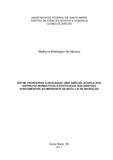| dc.contributor.advisor | Redin, Giuliana | |
| dc.creator | Moraes, Matheus Wellington de | |
| dc.date.accessioned | 2017-08-21T19:53:31Z | |
| dc.date.available | 2017-08-21T19:53:31Z | |
| dc.date.issued | 2017-07-12 | |
| dc.date.submitted | 2017 | |
| dc.identifier.uri | http://repositorio.ufsm.br/handle/1/11533 | |
| dc.description | Trabalho de conclusão de curso (graduação) - Universidade Federal de Santa Maria, Centro de Ciências Sociais e Humanas, Curso de Direito, RS, 2017. | por |
| dc.description.abstract | Many modifications mark the current global scenario. Amongst them, the international immigration has make a point owing to the growing number of people entering and leaving countries in search of better conditions and life perspectives. In that way, the actual research aims at understanding the complexity of the current immigration flows scenario, starting from mapping the main nacionalities which migrates to Brazil, such as its characteristics. It will be developed some reflections about the challenges faced by the immigrants since their departure from the country of origin until their first moves in Brazil, perceiving the sub-human scope of labour destinated to the immigrants, the search of survival and other peculiarities. Outsetting these statements, it will be analysed the brazilian legislation at the immigration's concern in a historic retrospective, in order to analyse the proccesses involved in the immigration quests, primarily relating to the national interests as predominate in accepting the immigrations as a threat to the State. Hence to the retrospective and analysis made in comparison between the Foreign Statute and the New Migration Law, we will seek to aware towards the challenges faced beyond the law, also the stigmas faced by the immigrants such as xenophobia and racism and the role they place in society. Whereas the existence of desirable and undesirable immigrant sorts to the State, this research focuses on considering those who suffer frequent infractions to their rights. We will pursue, then, to glimpse the ideal immigration model, which contemplates the Human Right to Immigrate. | eng |
| dc.language | por | por |
| dc.publisher | Universidade Federal de Santa Maria | por |
| dc.rights | Acesso Aberto | por |
| dc.subject | Fluxos migratórios | por |
| dc.subject | Estatuto do estrangeiro | por |
| dc.subject | Nova lei de migração | por |
| dc.subject | Vistos | por |
| dc.subject | Direitos humanos | por |
| dc.subject | Migration flows | por |
| dc.subject | Foreign statute | por |
| dc.subject | New migration law | por |
| dc.subject | Visa | por |
| dc.subject | Human rights | por |
| dc.title | Entre fronteiras e descasos: uma análise acerca dos entraves normativos à efetivação dos direitos fundamentais ao imigrante na nova lei de migração | por |
| dc.title.alternative | Amongst borders and faulties: an analysis about normative hindrances to the effectiveness of fundamental rights for immigrant within the new migration law | eng |
| dc.type | Trabalho de Conclusão de Curso de Graduação | por |
| dc.degree.local | Santa Maria, RS, Brasil | por |
| dc.degree.graduation | Direito | por |
| dc.description.resumo | Muitas modificações marcam o cenário atual mundial. Entre elas, a imigração internacional tem
chamado atenção pelo crescente número de pessoas a entrar e sair de países em busca de melhores
condições e novas perspectivas de vida. Neste sentido, a presente pesquisa busca compreender a
complexidade do atual cenário dos fluxos migratórios, partindo de um mapeamento das principais
nacionalidades que migram para o Brasil e uma compreensão de suas características. Desenvolve-se
reflexões a respeito dos desafios enfrentados pelos imigrantes desde o afastamento do país de origem
até os primeiros movimentos no Brasil, percebendo o campo laboral sub-humano destinado ao
imigrante, a busca pela sobrevivência e outras peculiaridades. A partir destas constatações, analisa-se
a legislação brasileira a respeito das imigrações em uma retrospectiva histórica, a fim de analisar os
processos envolvidos nas questões imigratórias, principalmente no tocante dos interesses nacionais
como fator predominante na aceitação de imigrantes no país e a ênfase na segurança nacional,
condição que exalta a imagem do imigrante como ameaça para o Estado. Após retrospectiva e análise
de comparação entre o Estatuto do Estrangeiro e a Nova Lei de Migrações, busca-se uma
sensibilização a respeito dos desafios enfrentados para além da lei, os estigmas enfrentados pelos
imigrantes como xenofobia e racismo e o espaço ocupado pelos mesmos na sociedade. Considerando
a existência de categorias de imigrantes desejáveis e indesejáveis para o Estado, a pesquisa foca em
refletir sobre aqueles que sofrem frequentes infrações aos seus direitos. Busca-se, então, vislumbrar o
modelo ideal de imigração, que contempla o Direito Humano de Imigrar. | por |
| dc.publisher.country | Brasil | por |
| dc.publisher.initials | UFSM | por |
| dc.subject.cnpq | CNPQ::CIENCIAS SOCIAIS APLICADAS::DIREITO | por |
| dc.publisher.unidade | Centro de Ciências Sociais e Humanas | por |


